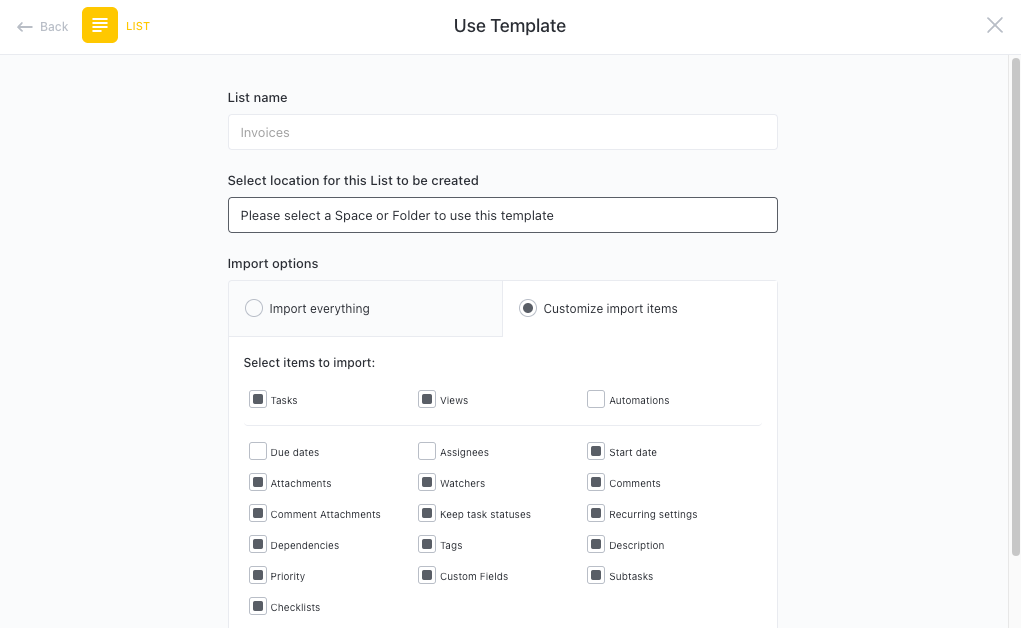When it comes to optimizing your website for search engines, having a well-defined SEO scope of work is crucial. It sets clear expectations, ensures accountability, and ultimately drives results. That's where ClickUp's SEO Scope of Work Template comes into play!
With ClickUp's SEO Scope of Work Template, you can:
- Define and outline the specific SEO tasks and deliverables for your project
- Set clear timelines and milestones to keep your team on track
- Assign responsibilities and track progress to ensure seamless collaboration
- Monitor and analyze the impact of your SEO efforts with integrated reporting tools
Whether you're an SEO agency or an in-house marketer, this template will help you streamline your SEO process and achieve top-ranking results. Get started with ClickUp's SEO Scope of Work Template today and take your website to new heights!
Benefits of SEO Scope of Work Template
When it comes to optimizing your website for search engines, having a clear plan is essential. The SEO Scope of Work Template can help you:
- Outline the specific tasks and deliverables for your SEO project
- Set clear expectations with your team or SEO agency
- Track progress and ensure that all necessary steps are being taken
- Identify potential gaps or areas for improvement in your SEO strategy
- Streamline communication and collaboration between team members
- Improve the overall effectiveness and efficiency of your SEO efforts.
Main Elements of SEO Scope of Work Template
ClickUp's SEO Scope of Work template is designed to help you effectively plan and execute your SEO projects. Here are the main elements of this Doc template:
- Custom Statuses: Use custom statuses to track the progress of your SEO tasks, such as To Do, In Progress, and Completed, ensuring transparency and accountability throughout the project.
- Custom Fields: Utilize custom fields to capture important information related to your SEO scope of work, such as Target Keywords, On-Page Optimization Checklist, Backlink Strategy, and more, allowing you to stay organized and focused on key deliverables.
- Different Views: Access different views within ClickUp to visualize and manage your SEO scope of work effectively. Whether you prefer the Board view to track tasks in a Kanban-style board, the Table view for a spreadsheet-like layout, or the Calendar view to schedule and monitor deadlines, ClickUp has you covered.
With ClickUp's SEO Scope of Work template, you can streamline your SEO projects, collaborate with your team, and achieve better search engine rankings.
How to Use Scope of Work for SEO
If you're looking to create a comprehensive SEO Scope of Work, follow these steps to ensure you cover all the necessary elements:
1. Define the project scope and goals
Start by clearly defining the scope of the SEO project. What are the specific goals you want to achieve? Do you want to increase organic search traffic, improve keyword rankings, or optimize on-page elements? Be as specific as possible to set clear expectations for both your team and your client.
Use custom fields in ClickUp to outline and track the project scope and goals.
2. Conduct a thorough website audit
Before you can develop an effective SEO strategy, you need to understand the current state of the website. Conduct a comprehensive website audit to identify any technical issues, on-page optimization gaps, or potential areas for improvement. This will help you prioritize your SEO efforts and create a roadmap for success.
Use the SEO Audit Checklist template in ClickUp to guide your website audit process.
3. Perform keyword research
Keyword research is a crucial step in any SEO project. Identify the keywords and phrases that are relevant to your client's business and have high search volume. This will help you optimize on-page content, create targeted landing pages, and develop a content strategy that aligns with user intent.
Use the SEO Keyword Research template in ClickUp to organize and track your keyword research findings.
4. Develop an on
-page optimization strategy
Once you have identified the target keywords, it's time to optimize the website's on-page elements. This includes optimizing meta tags, headings, URLs, and content. Develop a clear strategy for optimizing each page, ensuring that it aligns with the target keywords and follows SEO best practices.
Use tasks and subtasks in ClickUp to outline the on-page optimization strategy for each page.
5. Create a content plan
Content plays a crucial role in SEO success. Develop a content plan that includes a schedule for creating and publishing high-quality, keyword-optimized content. Identify the topics, formats, and target keywords for each piece of content. Additionally, consider incorporating content promotion and link building strategies to further boost the website's visibility.
Use the Content Calendar template in ClickUp to plan and schedule your content creation and promotion activities.
6. Monitor
, analyze, and report
Once the SEO strategy is implemented, it's important to continuously monitor the website's performance, analyze key metrics, and provide regular reports to your client. Use SEO tools and analytics platforms to track keyword rankings, organic traffic, and other relevant metrics. This will help you identify areas for improvement and demonstrate the impact of your SEO efforts.
Create a recurring task in ClickUp to regularly monitor, analyze, and report on the website's SEO performance.

Get Started with ClickUp's SEO Scope of Work Template
SEO agencies and freelancers can use this SEO Scope of Work Template to effectively communicate and manage SEO projects with clients.
First, hit “Get Free Solution” to sign up for ClickUp and add the template to your Workspace. Make sure you designate which Space or location in your Workspace you’d like this template applied.
Next, invite the relevant members or guests to your Workspace to start collaborating.
Now you can take advantage of the full potential of this template to create a comprehensive SEO Scope of Work:
- Use the Overview view to provide a brief summary of the project, including goals and objectives
- The Keyword Research view will help you identify the most relevant and valuable keywords for the project
- The On-Page Optimization view allows you to optimize meta tags, headings, and content for better search engine visibility
- Use the Off-Page Optimization view to plan and execute strategies like link building and social media promotion
- Organize tasks into different phases such as Research, Implementation, Monitoring, and Reporting to track progress
- Assign tasks to team members and set deadlines to allocate responsibilities efficiently
- Review and update tasks regularly to keep clients informed and ensure project success.









